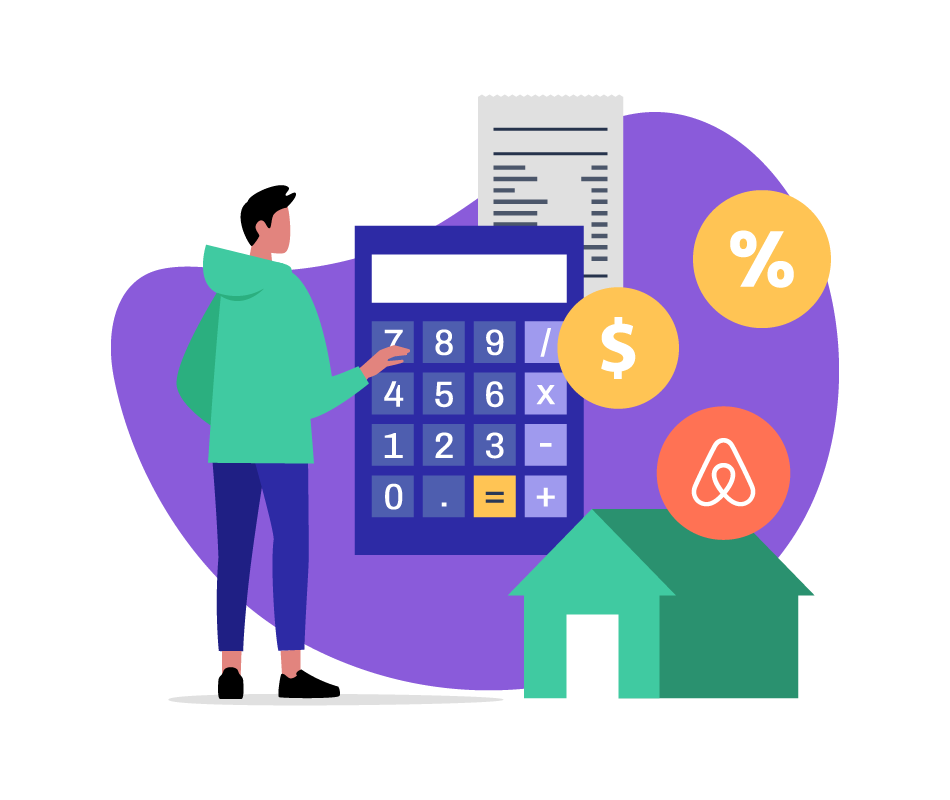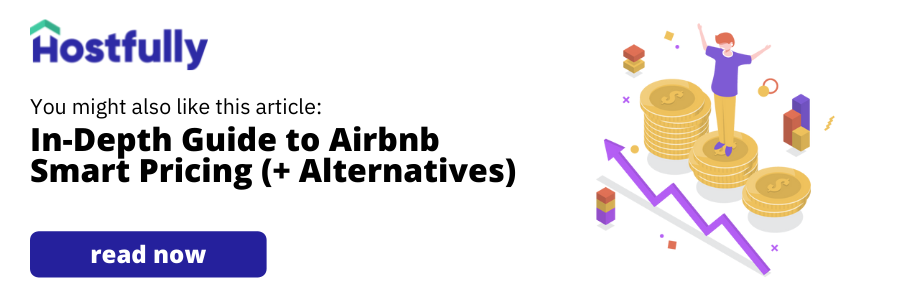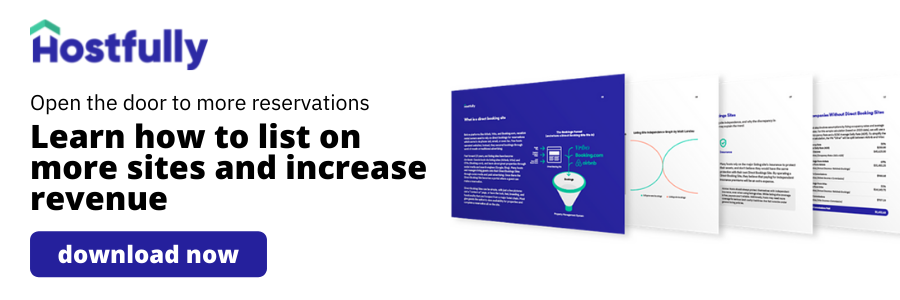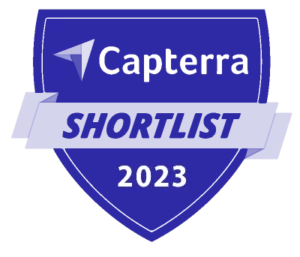Whether you manage one or numerous short-term rentals on platforms like Airbnb, Vrbo, Booking.com and others, most property owners share the same goal: to maximize profits. Today, vacation rental management companies (VRMCs) represent a $115 billion industry. To take advantage of current and future market trends, an Airbnb calculator can help you get the biggest bang for your buck.
How much do Airbnb hosts earn?
If you’re an Airbnb newcomer, do you want this to be a side hustle or a full-time career? Many hosts simply list their second homes for the weeks that the property is unoccupied, which is very different from investing in a guest-only Airbnb to rent year-round. With this range of hosting models in mind, it figures that the average monthly income for Airbnb hosts is $924, which is $11,088 per year. However, if you do decide to go full-time, you can earn a lot more.
Of course, Airbnb hosts can expect to make more if they have multiple properties to rent—but this also comes with higher overheads and higher monthly expenses. As property managers build a bigger portfolio and begin to move up the VRMC maturity model, the costs of management, upkeep and marketing will also begin to grow. For the more serious Airbnb host, these are key considerations that determine overall profit.
Whichever stage you’re at in your vacation rentals business, you’ll want to have a good estimation of what you can earn from an Airbnb before you take the leap. A reliable valuation will not only help to set competitive daily rates but also estimate future returns. Here are some guidelines for pinning-down those all-important numbers.
1. Take advantage of the Airbnb calculator
When you create a profile and listing in Airbnb, the Airbnb calculator will recommend pricing. While Airbnb’s calculator can function as a guideline and cut the work out of your pricing strategy, the truth is that it should be approached with caution. The built-in algorithm automatically generates a bargain price, and it doesn’t pick up on certain factors. Among them are rental appreciation and depreciation, seasonal pricing variance, geolocation comparison, and other topics we’ll cover later on.
Naturally, Airbnb’s best interest is for guests to come back, so the system sets a price to allure returning customers. So, use the Airbnb estimator with a light touch. You can always reappraise this number later by using a third-party Airbnb pricing software to improve financial returns.
2. Know your own game: The DIY approach
If you want to estimate Airbnb revenue yourself, you’ll first need to gain a complete picture of comparables in your area. As a snapshot, these indicators range from prices to location to amenities offered. You’d then need to aggregate all of that information in a spreadsheet in order to make a comparison.
It’s also worth collecting data on your competitors to optimize your pricing strategy. By taking a look at the calendars of comparable rentals, you’ll be able to see how far in advance they book and whether they raise prices in high season. A local survey of these factors will help you to define a competitive pricing model.
Whether or not you choose to pay for pricing and valuation software, it’s still worth making your own assessment. As well as giving you some core figures, it may help to highlight areas of demand, which can pinpoint strategic investments for your property. Fundamentally, you’ll gain an informed awareness of the key metrics defining your profit margins.
3. Use technology
Software like AirDNA and Key Data Dashboard takes the guesswork out of predicting potential income for short-term vacation rentals. With its own algorithms, this type of software scopes out local markets to make a comparative analysis. Just by typing an address, you can extract metrics from a specific area to optimize pricing—and also determine if a property is worth purchasing.
Hosts wanting to leverage this kind of data have two options: use free reports, or go premium. The free-of-charge option does offer some useful insights around average daily rate, general occupancy rates, and seasonal trends. The most valuable and actionable analysis, however, comes from advanced paid features that go in-depth on key metrics. This might include peak times for a given area, occupancy rates for specific types of property, most in-demand amenities, and digital insights for optimizing multi-channel distribution.
For many property owners, tools like these are worthy early investments to establish themselves in today’s complex vacation rental market. At the end of the day, the insights extracted from these kinds of technologies form part of your due diligence in property management.
We’ve put together a guide of resources that you can use to do your data collection:
Click to download (It’s free!)
4 Airbnb Calculator Alternatives
Save time and ensure you have all the information before acquiring new properties.
With the main methods for profit calculation covered, let’s take a closer look at the metrics for predicting Airbnb rental valuation and income.
What is your vacation rental worth?
In the Airbnb world, value is not always intuitive. There are many different factors that influence the desirability and profitability of a particular investment property. From treehouses to design homes, each type of Airbnb property comes with a different price tag and Airbnb pricing strategy.
Key metrics like occupancy rate, the average length of stay, average daily rate, and annual expenses will also affect how much cash flow you will see from your properties. That said, the basics of valuation are pretty much constant:
1. Size
You know how the saying goes: the more the merrier. More bedrooms and bathrooms influence the value of your short-term vacation rental. Under this also falls the total number of square feet. Generally speaking, the bigger the space and the more rooms available, the more you can charge.
2. Location
Property values fluctuate in every city, even from one neighborhood to the next. This is why it’s important for an Airbnb estimator to give a competitive analysis of rentals with similar profiles in your area. Aside from the city or county your rental is in, proximity to attractions and local activities also have a bearing on the desirability—and price—of an Airbnb.
3. Amenities
Maybe you have a Finnish sauna or pool attached to your vacation rental, or perhaps you offer food and beverages to guests like coffee, cooked breakfast or gift baskets. For any special service or amenity you provide, you should consider how it aligns with the guest persona you are catering to and stick with it. While decking out your rental with every amenity available can seem like a quick fix, it’s not totally necessary to have all the bells and whistles. A curated, targeted offering will often be more desirable and cost-effective, which is good news for revenue.
Done right, add-ons make your properties more desirable which boosts valuation and increases your chances of becoming a super host. Choose carefully—energy-consuming amenities like hot tubs will consume resources and introduce hefty management costs. Be aware of this in your Airbnb price and valuation.
4. Seasonality
Depending on where your vacation properties are located on the map, your projected income may change depending on the climate and season. A rustic vacation rental in Vail, Colorado will see more Airbnb occupancy in winter compared to an urban loft in Chicago. Rates should reflect when there’s a seasonal demand, which is one of the key advantages of using an Airbnb calculator.
5. Attractions
Another factor that an Airbnb estimator takes into consideration is nearby attractions. Maybe your vacation rental is near the Appalachian Trail or a national park. Nearby attractions enhance real estate’s value and are included in the equation.
6. Length of stay
The length of stay will change your monthly rental income. Short-term rentals typically go for a higher nightly rate than long-term rentals. However, there are more costs associated with short terms rentals than long-term rentals. Weighing the costs of monthly expenditures and pricing of long-term rentals vs short-term rentals will greatly affect your Airbnb earnings.
Make sure that your Airbnb listing properly communicates all that you offer. This will justify your price point to potential customers.
Click to download (It’s free!)
4 Airbnb Calculator Alternatives
Save time and ensure you have all the information before acquiring new properties.
Airbnb income calculator: how to value your Airbnb rental
At the end of the day, you want to make sure that you’re making a return on investment with your vacation rental properties. While Airbnb hosting and vacation rental is a people-focused business, you also need to know it’s worth your while financially. Besides setting your properties at the most competitive price, a rental calculator can assist hosts with managing:
Annual Revenue
Stop guessing and start strategizing! Among the most diligent property owners, one of the core benefits of an Airbnb profit calculator is calculating your projected annual revenue. You can do this by multiplying your average daily rates by the occupancy rate.
So, if you charge $100 a night with a 70% occupancy rate, you would multiply 100 by 0.70, followed by 365 for days out of the year. So, 100 x 0.70 x 365 = $25,550. Before expenses and taxes, this isn’t too shabby.
Whatever the number, having an estimate of your annual revenue will help determine budgets for external services like cleaning fees, maintenance, marketing, etc.
Annual Expenses
From seasonal upkeep to replacing lost or broken items, every Airbnb host must take care of annual expenses. Whether you’ve got a one-bedroom flat or a luxury villa on your hands, one expense that will be consistent for all hosts is turnover and cleaning. Sometimes following a cleaning checklist for vacation rentals is adequate, but for multi-property portfolios, it’s usually easier to outsource cleaning services and general upkeep. This must be factored into your Airbnb income potential.
Let’s not forget about monthly taxes and utilities. You should be aware of the breakdown of local taxes for each of the properties you manage, as well as any unique utilities that might spike seasonally, such as air conditioning and pool cleaning in the summer.
Annual expenses will also largely depend on whether or not you’re a homeowner or you are using the method of Airbnb rental arbitrage. If you’re still paying a mortgage as an Airbnb host or paying monthly rent, you’re going to have more annual expenses than most Airbnb profit calculators reflect. Be sure to detract any outstanding monthly payments from the final amount.
Annual expenses will evolve as your business does, with expenditure on external services becoming a necessity at a certain point. While it may seem like a lot of upfront costs, the result will make you more competitive in an increasingly saturated market, boosting long-term revenue.
Crunching the numbers
Dedicated Airbnb hosts do a lot more than set a flat nightly rate and hope for the best results. Successful vacation rental property owners must know exactly what makes a valuable, profitable home. With that as background, using Airbnb calculator is a sure-fire way to get the most out of your rental.












